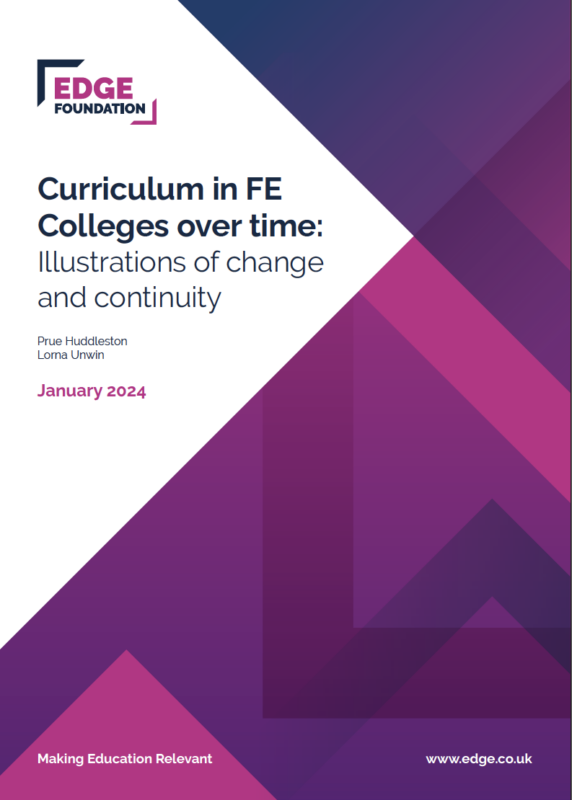Learning from the Past – Further Education Curriculum Development

In this article, Olly discusses Edge’s latest Learning from the Past paper written with Professor Prue Huddleston and Professor Lorna Unwin about curriculum in FE colleges.
Over the past century, England’s Further Education (FE) colleges have evolved into anchor institutions that are uniquely positioned to address changing societal and workforce needs. Despite their adaptability, though, FE continues to grapple with ongoing challenges relating to creating inclusive courses, competing for students and navigating fluctuating requirements from stakeholders including employers and national governments.
With skills central to current education policy debates, understanding the historical context of FE is essential. Edge’s new ‘Learning from the Past’ paper explores over 100 years of FE curriculum development, and it ebbs and flows. While FE colleges face unique contemporary challenges, including integrating environmental and decolonisation principles into their curricula, they must also address the perennial task of meeting stakeholder demand. What can we learn from past policies?
Employer engagement and political dynamics in FE curriculum development
Traditionally, FE has always offered diverse curricula, incorporating general, vocational, and technical education. Its breadth extends to its audience, too: Young people and adults, specialist skill areas, higher education, and those with special educational needs. Such complex requirements create challenges for a cohesive system, a problem only exacerbated by top-down policy implementation, economic shifts, and funding cuts. This tension will be familiar to anyone in the sector. On one hand, local institutions have the knowledge, expertise, and skills to deliver and support skill needs in local communities. On the other, governments use education and training policies to address varied social and economic goals, ensuring that FE curriculum development is always a political issue.
Our research shows that the tension between centralised policymaking and FE college autonomy is not new. FE curriculum development is replete with examples of institutions successfully engaging with employers to create high-impact training. For instance, industry associations contributed significantly to the Boot and Shoe School, which opened in Northamptonshire in 1928. They supported with overall training costs, and provided machinery and materials to help train those employed in local shoe factories. Meanwhile, the Westminster School of Hospitality and Culinary Arts, which opened in 1910, was specifically founded by employer associations to produce highly trained chefs and hospitality managers for London’s growing hotel and restaurant sector. We find many similar examples throughout the history of FE.
Perhaps the most informative findings revealed in the report, though, are the impacts of government interventions. An illustrative example is the 1992 Further and Higher Education Act, which mandated that colleges should only receive funding for courses defined as vocational or work-related. Some colleges creatively worked around this, for example, by turning flower arranging into ‘floristry’ to align with the new standards. Despite valiant efforts, the policy set in progress a downward spiral of adult education participation, however, that has yet to fully recover, demonstrating the long-term consequences when policy interventions are poorly considered.
The report also highlights that government intervention in FE is deeply rooted. Minutes of meetings from the Derby Branch of the Association of Teachers in Technical Institutions, spanning 1907 to 1973, repeatedly reveal members’ frustration with government directives. For instance, in 1949, the Association objected to increased workloads resulting from new examination regulations, and more specifically, the lack of consultation with their lecturers. Perhaps not an unfamiliar refrain to many working in the sector today!
General education in FE and its modern manifestations
Another interesting issue raised in the report is the ongoing debate over the role of ‘general’ or ‘liberal’ education in FE. This gained prominence after WW2 as the nation sought to enhance its technological capabilities. One 1956 White Paper highlighted the importance of balancing technical studies and skills with spiritual and human values. Liberal studies in FE went on to provide new autonomy to many lecturers, allowing them to collaboratively engage with students and critique prevailing ideas about education, work, and society at large.
Today’s concept of curriculum breadth or general education is typically framed as ‘enrichment’, and it encompasses activities that develop students’ character, skills, attitudes, and confidence as they relate to modern vocational roles. The government currently mandates colleges to publish summaries of how career programmes align with the Gatsby benchmarks. Enrichment is particularly relevant to T Levels, which have a limited general education element. There are concerns, for example, about the availability of languages in FE colleges in general and the omission of compulsory language learning in T-levels, in particular.
While this touches on a mere handful of the issues outlined in the report, it makes fascinating reading both from a historical and policymaking perspective. Exploring the history of FE curriculum development is essential for informing present decision-making around skills. Moreover, enhancing our collective policy memory will contribute to a more enlightened approach. It can help us avoid the pitfalls of the past as we create a modern Further Education system that is robust, relevant and which serves the needs of generations to come.
By Olly Newton, Executive Director, Edge Foundation
FE News on the go
Welcome to FE News on the go, the podcast that delivers exclusive articles from the world of further education straight to your ears.
We are experimenting with Artificial Intelligence to make our exclusive articles even more accessible while also automating the process for our team of project managers.
In each episode, our thought leaders and sector influencers will delve into the most pressing issues facing the FE.












Responses